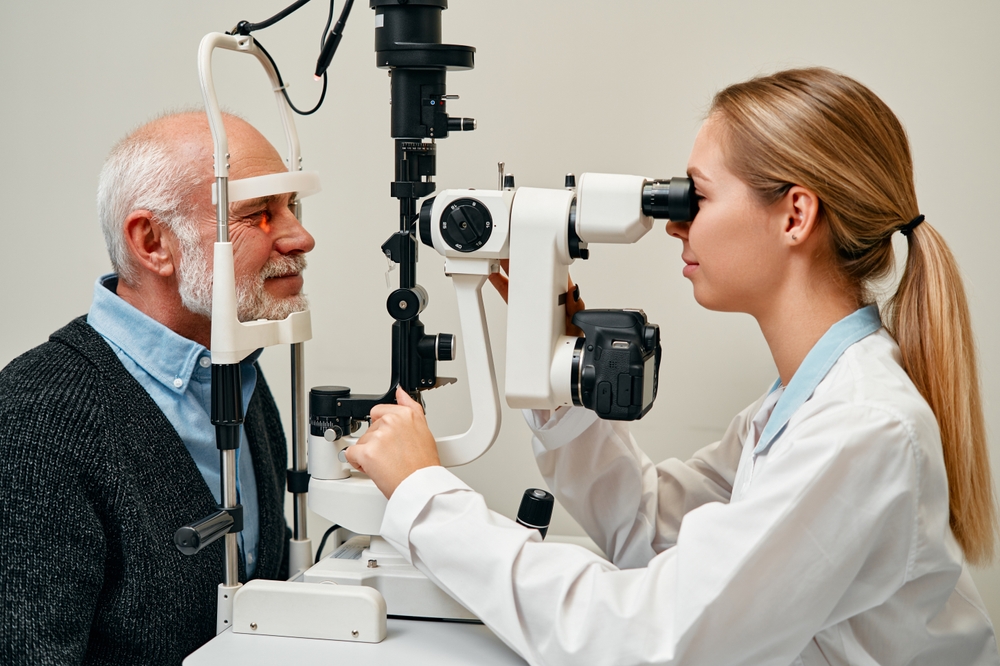Do Eye Exams Include Screenings for Cataracts?
October 4, 2024
Cataracts are one of the most common types of age-related vision changes. Because it's a natural result of the aging process, everyone will get cataracts eventually.
Once advanced, cataracts can cause significant vision problems and limit your ability to do daily activities. It's best to see your eye doctor for a cataract evaluation to determine whether or not you have cataracts.
However, if you notice symptoms of cataracts, your eye doctor may be able to tell if you are developing them during a routine eye exam. Keep reading to learn more about cataracts and whether or not eye exams include screenings for cataracts!
What Are Cataracts?
 Cataracts are cloudy patches that develop inside the lens of the eye. Most cataracts are age-related and appear as the lens proteins deteriorate and form opaque clumps.
Cataracts are cloudy patches that develop inside the lens of the eye. Most cataracts are age-related and appear as the lens proteins deteriorate and form opaque clumps.
These cloudy patches can prevent light from reaching the retina, which can cause vision changes or vision loss. Cataracts can be very small when they first develop, and you might not even know you have them.
Over time, they can get larger and cover more of the lens. As they expand, they can affect your vision.
Common symptoms of cataracts include:
- Frequent changes to your glasses prescription
- Blurry vision
- Light or glare sensitivity
- Seeing new or worsening halos around lights
- Difficulty seeing in low light
- Colors look dull or dimmer
Eventually, cataracts can cause persistent cloudy or blank spots in the field of vision, making daily tasks like reading or driving difficult.
How Do Eye Doctors Test For Cataracts?
In most cases, eye doctors can detect cataracts during a comprehensive eye exam. Sometimes, an eye exam might reveal cataracts before you know you have them.
Cataract screening is part of a dilated eye exam. Your eye doctor will give you eye drops to dilate your pupils, the black part in the center of the eye.
With the pupil fully expanded, your eye doctor can see the inner structures of the eye using lights and magnifying tools. Your eye doctor will have you sit in front of a device called a slit lamp, which is a specialized binocular microscope.
It's non-invasive, and you won't feel any discomfort. The device offers a magnified view of the eye so your eye doctor can identify cataracts and any other eye conditions that may be developing, such as:
- Corneal conditions
- Glaucoma
- Retinal problems
- Dry eye
- Eye infections
What Happens If I am Diagnosed With Cataracts at a Routine Eye Exam?
 If you are diagnosed with cataracts during a routine eye exam, your eye doctor will discuss the severity of your condition and recommend an appropriate course of action. The approach typically depends on how advanced your cataracts are and how much they're affecting your vision and daily life.
If you are diagnosed with cataracts during a routine eye exam, your eye doctor will discuss the severity of your condition and recommend an appropriate course of action. The approach typically depends on how advanced your cataracts are and how much they're affecting your vision and daily life.
Monitoring Minor Cataracts
For minor cataracts that don't significantly impact your vision, your eye doctor will likely suggest:
- Periodic follow-up appointments to monitor the progression of your cataracts.
- Managing vision changes with updated prescriptions for glasses or contact lenses.
- Making adjustments to your environment, such as using stronger lighting in your home or office
- Increasing the brightness on your electronic devices like phones or computers
It's important to note that there are currently no medical treatments that can slow down or prevent the progression of cataracts. They will continue to develop over time, although the rate of progression can vary significantly from person to person.
Schedule a Cataract Evaluation
Addressing Advanced Cataracts
As cataracts progress and begin to interfere with your daily activities, your eye doctor may recommend cataract surgery. This is the only treatment that can effectively reverse the vision changes caused by cataracts.
Cataract surgery is:
- A safe and effective procedure
- Typically performed in an ophthalmologist's office
- Designed to remove the clouded natural lens and replace it with a clear artificial intraocular lens (IOL)
The procedure not only removes the cataract but can also correct other vision problems like astigmatism, nearsightedness, and farsightedness, depending on the type of IOL used. If you find that cataracts are starting to limit your ability to engage in activities you enjoy, it's time to discuss cataract surgery with your eye doctor.
What is a Cataract Evaluation?
A cataract evaluation is a specialized eye exam focusing on detecting and assessing cataracts. During this exam, your eye doctor dilates your pupils and uses a slit lamp microscope to examine your eye's lens in detail.
They may also conduct visual acuity tests and check for glare sensitivity. This evaluation helps determine if you have cataracts, their severity, and whether treatment is necessary.
If cataracts are detected, your eye doctor will discuss management options, which may include monitoring or recommending cataract surgery. Regular evaluations are crucial for maintaining good eye health.
If you have cataracts that have started to limit your ability to take part in activities you enjoy, talk to your eye doctor about cataract surgery. Schedule an appointment at Carroll Vision Center in Westminster, MD, and Chevy Chase, MD, to learn more!



